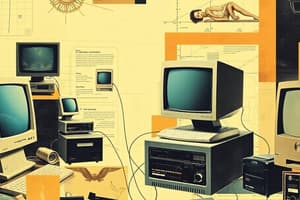Podcast
Questions and Answers
What does the term 'computer' come from?
What does the term 'computer' come from?
The term 'computer' comes from the Latin word 'computare,' which means to calculate or programmable machine.
Who is considered the 'father of the computer'?
Who is considered the 'father of the computer'?
Charles Babbage is considered the 'father of the computer' due to his pioneering work in designing the first mechanical computer in 1822.
What are programs in the context of computers?
What are programs in the context of computers?
Programs are sets of instructions or commands that tell the computer what to do, written in a language that the computer understands.
What is the main part of a computer system known as?
What is the main part of a computer system known as?
Where are peripherals devices attached in a modern computer system?
Where are peripherals devices attached in a modern computer system?
Where are computers found in our daily lives?
Where are computers found in our daily lives?
What are some important areas where computers play a big role?
What are some important areas where computers play a big role?
What was the first application of computers?
What was the first application of computers?
How do robots controlled by computers contribute to scientific research?
How do robots controlled by computers contribute to scientific research?
How do computers help companies in business applications?
How do computers help companies in business applications?
What role do computers play in education?
What role do computers play in education?
How have computers transformed the entertainment industry?
How have computers transformed the entertainment industry?
Why do banks heavily rely on computers?
Why do banks heavily rely on computers?
What are some specific tasks that computers help with in banks?
What are some specific tasks that computers help with in banks?
How do computers contribute to the medical/healthcare sector?
How do computers contribute to the medical/healthcare sector?
What impact do computers have on communication?
What impact do computers have on communication?
Flashcards are hidden until you start studying
Study Notes
Origins and History of Computers
- The term 'computer' originates from the Latin word "computare," meaning to calculate or count.
- Charles Babbage is recognized as the 'father of the computer' for his design of the Analytical Engine, an early mechanical general-purpose computer.
Understanding Computer Programs
- Programs refer to a set of instructions that tell a computer how to perform specific tasks or operations.
Main Components of a Computer System
- The core component of a computer system is known as the Central Processing Unit (CPU), which executes instructions and processes data.
Peripheral Devices
- Peripheral devices, such as printers, keyboards, and mice, are connected to a computer via ports, allowing for input, output, and additional functionalities.
Computers in Daily Life
- Computers are ubiquitous in daily life, found in devices like smartphones, tablets, and home appliances, impacting communication, entertainment, and productivity.
Key Areas of Computer Importance
- Computers play significant roles in industries such as education, healthcare, finance, and manufacturing, enhancing efficiency and innovation.
Early Applications of Computers
- The first application of computers was primarily in calculations and data processing for tasks like accounting and scientific research.
Robotics and Scientific Research
- Computers control robots used in scientific research, facilitating data collection, experiments, and complex simulations that would be difficult for humans to perform.
Business Applications
- Companies use computers for various business applications, including inventory management, customer relationship management, and data analysis, leading to streamlined operations and informed decision-making.
Role in Education
- In education, computers provide access to vast resources, facilitate online learning, and enhance interactive teaching methods, transforming traditional learning environments.
Transformation of Entertainment
- Computers have revolutionized the entertainment industry by enabling digital content creation, streaming services, and interactive gaming, enhancing user experiences.
Banking and Computer Reliance
- Banks heavily rely on computers for transaction processing, data storage, security, and customer service, ensuring efficiency and security in financial operations.
Specific Banking Tasks
- Computers assist in tasks such as online banking, loan processing, fraud detection, and the management of financial records, improving speed and accuracy.
Contribution to Healthcare
- In the healthcare sector, computers are used for patient record management, diagnostic tools, medical imaging, and telemedicine, enhancing patient care and operational effectiveness.
Impact on Communication
- Computers have transformed communication through emails, social media, and instant messaging, fostering global connectivity and real-time information exchange.
Studying That Suits You
Use AI to generate personalized quizzes and flashcards to suit your learning preferences.




